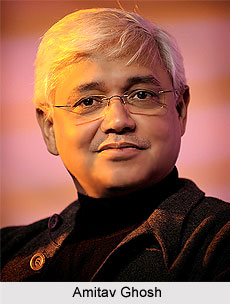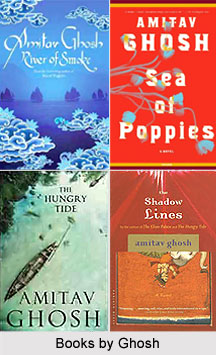 Amitav Ghosh, a Bengali Indian, was born in 1956 in the Indian city of Kolkata, in the Indian state- West Bengal is a English language author. He grew up in Bangladesh, Sri Lanka, Iran and India. He went to Oxford to study Social Anthropology after graduating from University of Delhi. Amitav Ghosh received a Master of Philosophy and awarded a Ph.D. in 1982.
Amitav Ghosh, a Bengali Indian, was born in 1956 in the Indian city of Kolkata, in the Indian state- West Bengal is a English language author. He grew up in Bangladesh, Sri Lanka, Iran and India. He went to Oxford to study Social Anthropology after graduating from University of Delhi. Amitav Ghosh received a Master of Philosophy and awarded a Ph.D. in 1982.
Personal Life of Amitav Ghosh
He lives in New York with his wife and his children. His wife, Deborah Baker is the author of "In Extremis: The life of Laura Riding" and senior editor at Little, Brown and Co.
Life as a Writer for Amitav Ghosh
Amitav Ghosh joined as Distinguished Professor in Comparative Literature, the faculty at Queens Collage in the City University of New York in 1999. Since 2005 he has also been visiting professor of Harvard University to the English department. He has been a journalist too.
Amitav Ghosh published his first novel "The Circle of Reason" and the second one "The Shadow Lines" in 1986 and 1988. He wrote "In an Antique Land" in 1993 as a result of his visit to Egypt to do field work in the Fellaheen village of Lataifa in 1980. Since then "The Calcutta Chromosome" in 1995 and "The Glass Place" in 2000 had published. "The Hungry Tide" is his latest work on fiction. It was published in 2004. He won India`s most prestigious literary award the "Sahitya Akademi Award" for his "The Shadow Lines" in the English language category. The novel focuses on the family of the narrator in Calcutta and Dhaka and their connection with an English family in London. "The Calcutta Chromosome" won the "Arthur C. Clarke Award" in 1997. The novel has been described as a kind of mystery thriller.
Apart from fiction Amitav Ghosh is also involved with writing non-fiction. "Countdown" is a book on India`s nuclear Policy and is one of his major works in non-fiction. His Other work in non-fiction includes "The Imam and the Indians" - a collection of essays on various topics such as history of the novel, Egyptian culture and literature; and "Dancing in Combodia, At Large in Burma".
Amitav Ghosh`s work is not easy to label. His works are attributed with strong themes but are not formulaic. His work which is braided with post-colonialisms and Indo-nostalgic elements established this writer and journalist as one of the finest writer of his generation.
 "Ghosh has established himself as one of the finest prose writers of his generation of Indian writing in English" - Financial Times. He weaves "indo-nostalgic" elements in his unique and personal topics enriched with heavier themes. Overlapped in part with post-colonialism his fictions are attributed by strong themes.
"Ghosh has established himself as one of the finest prose writers of his generation of Indian writing in English" - Financial Times. He weaves "indo-nostalgic" elements in his unique and personal topics enriched with heavier themes. Overlapped in part with post-colonialism his fictions are attributed by strong themes.
Awards Received by Amitav Ghosh
* He was awarded the prestigious "Padma Shri Award" by Government of India in 20th June 2007.
* Penguin, India has also awarded his proposed work on trilogy.
* In 2009, he was elected a Fellow of the Royal Society of Literature.
* The Circle of Reason won the Prix Medicis etranger, one of France`s top literary awards The Shadow Lines won the Sahitya Akademi Award and the Ananda Puraskar.
* The Calcutta Chromosome won the Arthur C. Clarke Award for 1997.
* Sea of Poppies was short listed for the 2008 Man Booker Prize. It was the co-winner of the Vodafone Crossword Book Award in 2009, as well as co-winner of the 2010 Dan David Prize
Books Written by Amitav Ghosh
Novels
* The Circle of Reason (1986)
* The Shadow Lines (1988)
* The Calcutta Chromosome (1995)
* The Glass Palace (2000)
* The Hungry Tide (2005)
* Sea of Poppies (2008)
* River of Smoke (2011)
Non-Fiction
* In an Antique Land (1992)
* Dancing in Cambodia and At Large in Burma (1998; Essays)
* Countdown (1999)
* The Imam and the Indian (2002; Essays)
* Incendiary Circumstances (2006; Essays)













